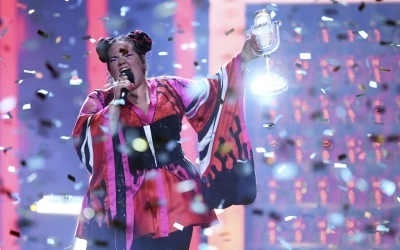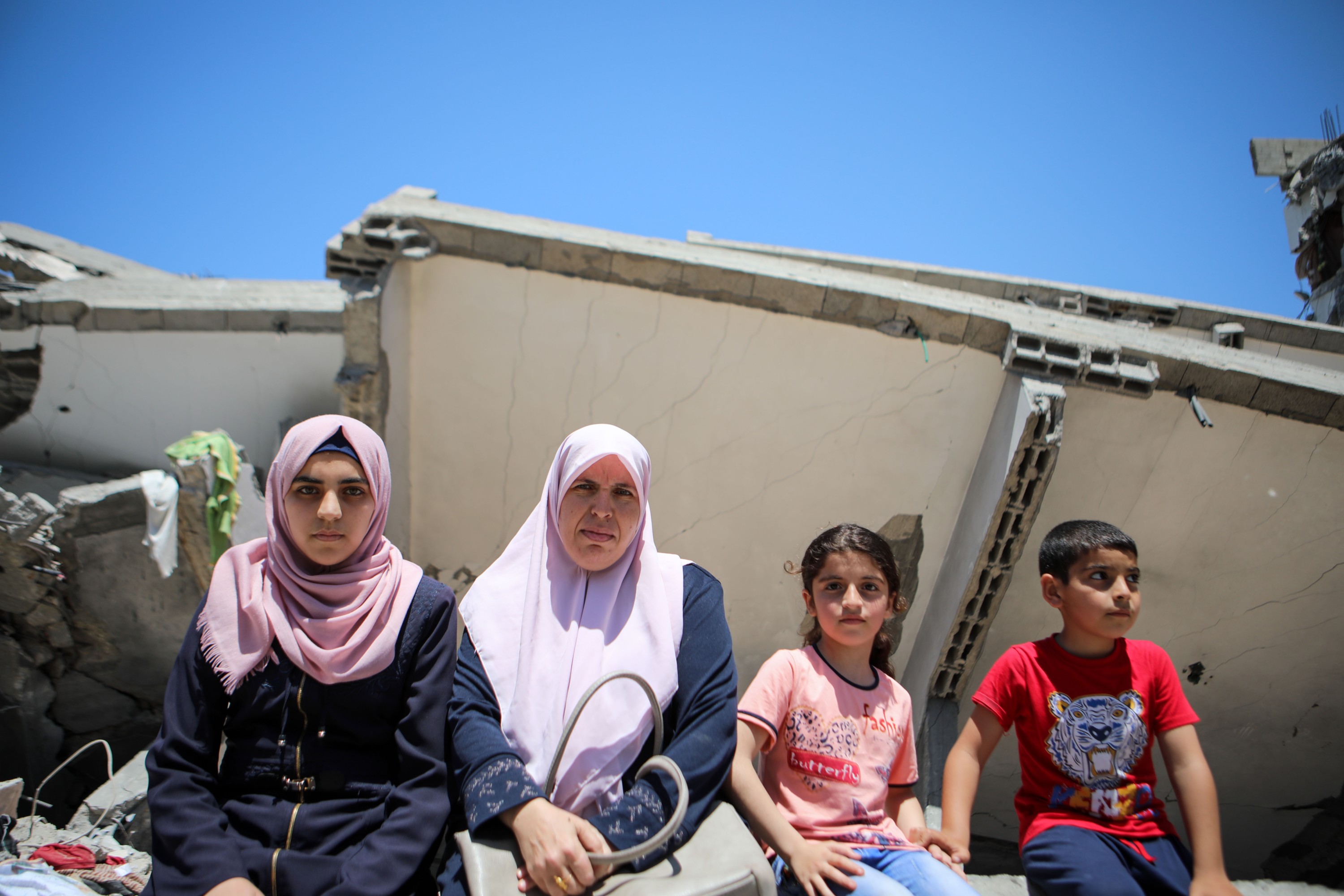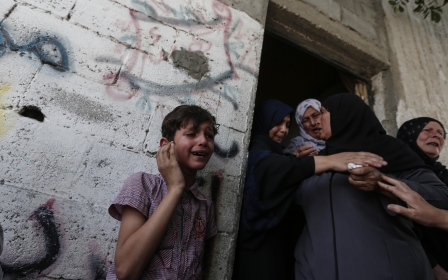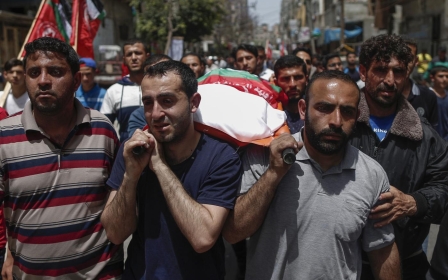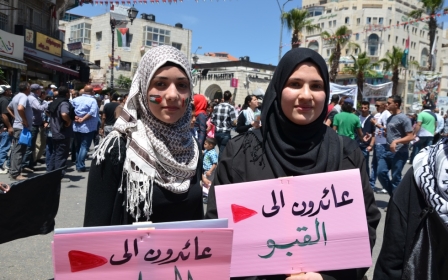Gazavision: Palestinians hold music event in defiance of Israel's Eurovision
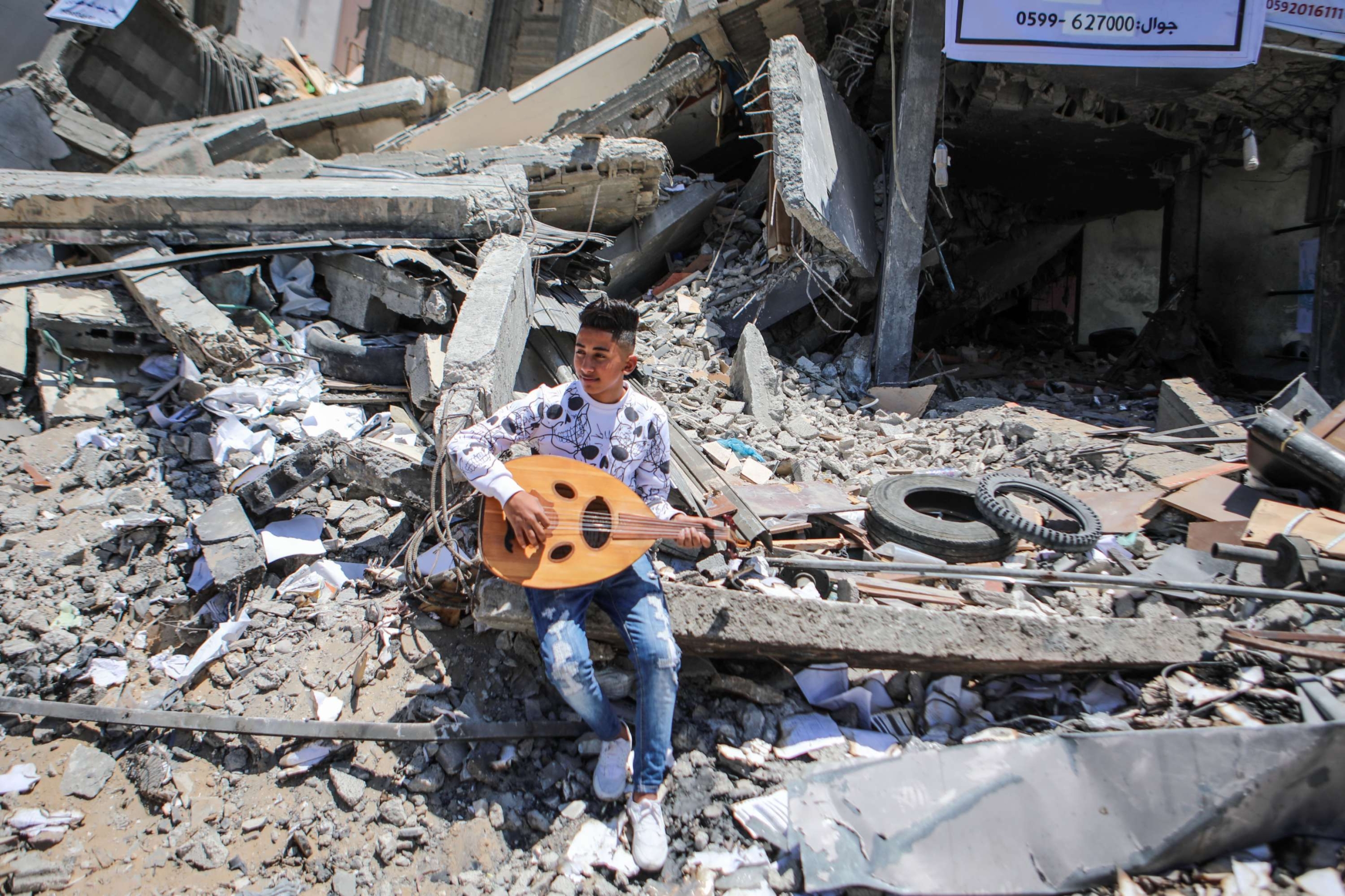
As Israel rolls out red carpets for the Eurovision music contest it's hosting this week, Palestinian musicians in Gaza have taken to a much different stage.
In the rubble of an eight-storey residential building destroyed in recent Israeli air strikes, the performers on Tuesday inaugurated Gazavision, an event they say aims to present a defiant and peaceful critique of Israeli policies - through song.
'We want to send a message to the Israeli occupation that Gaza will not surrender'
- Salem Harara, Gazavision organiser
The venue was not chosen by accident.
For the event's organisers - a group called Jusour (Arabic for "bridges") - the decision to hold the performance where the Abu Qamar building once stood was symbolic.
"We want to send a message to the Israeli occupation that Gaza will not surrender. Like the phoenix when it is turned to ashes, Gaza will rise again," 22-year-old Salem Harara, one of the organisers, told Middle East Eye.
New MEE newsletter: Jerusalem Dispatch
Sign up to get the latest insights and analysis on Israel-Palestine, alongside Turkey Unpacked and other MEE newsletters
"Music is an internationally recognised language of peace and love. We chose music because we wanted our peaceful message, laden with love, to reach all the people around the world," he added.
"We want to send a message to the world, which might have a negative image about Gaza and its people, that we love life."
'Art-washing'
Kamel Musallam, another coordinator for the event, told MEE that the concert was part of a global campaign calling for the boycott of this year's Eurovision contest.
Israel won the 2018 Eurovision competition, granting it hosting rights for this year's show - despite outrage from Palestinians and their supporters.
According to the members of Jusour, Eurovision is "art-washing ... Israeli crimes".
"Local and international efforts have been exerted to stop [Israel from] holding this contest on Palestinian blood, but it seems it is still going on," Musallam said.
Eurovision 2019: Why is Israel hosting the song contest?
+ Show - HideThe name of the singing contest suggests it’s a European affair, so why is Israel, a country in the Middle East, able to participate and why is it hosting this year’s contest?
Eligibility for Eurovision is not based on geography but membership of the European Broadcasting Union (EBU), which organises the event, and the Israeli Public Broadcasting Corporation is a member.
Technically, this means that Arab countries including Egypt, Jordan, Lebanon, Syria, Morocco and Tunisia are also eligible to participate.
In fact, Morocco took part in 1980 after Israel withdrew because the date of the contest overlapped with the Jewish holiday of Passover.
Israel first entered Eurovision in 1973 and has won the competition four times, including last year when Netta Barzilai won in Portugal. It previously hosted the event in 1979 and 1999, both times in Jerusalem.
Still, he added that hundreds of international artists have boycotted the event, including Pink Floyd musician and prominent Boycott, Divestment and Sanctions (BDS) movement supporter, Roger Waters, who has also been a vocal critic of Israel hosting Eurovision this year.
Waters is not the only major musician to voice opposition to Eurovision taking place in Israel.
Guitarist Joff Oddie from the band Wolf Alice told Sky News on Tuesday that Israeli leaders were "us[ing] culture to… whitewash over their human rights abuses".
Musallam said that high-profile support for BDS - a movement that aims to pressure Israel to end its human rights abuses against Palestinians - was encouraging.
"We are not alone in this anti-Eurovision campaign," he said.
Another Gazavision event organiser, Sumayya al-Katari, 21, told MEE that Israel is using Eurovision to try "to tell the world that it is a stable country full of tourist attractions like any European country".
It is also "using famous international musicians by paying them tens of millions [of dollars]", she said, referring to Madonna's controversial and costly planned performance later this week.
But, Sumayya said, "Israel is telling lies about itself.
"Israel would not be seen as a stable or attractive state by fans if the truth about its creation, its disrespect of human rights, international law and its inhumane treatment of Palestinians was disclosed."
She said she hoped the Gazavision event would, through music and song, help Palestinians share their own message.
"Although we do not have their capacity ... we are able to share our truthful message about the Israeli occupying state, which is neither stable nor peaceful, but a brutal human rights abuser."
Lost dreams
While attendees at the event on Tuesday were supportive of the general message, the location of the concert hit some members of the public hard.
One of them was Marwa Issa, 48, who sat listlessly by the side of the stage with two of her daughters.
Issa and her nine children were one of more than 30 Palestinian families who lived in the Abu Qamar building before it was destroyed by an Israeli air strike on 5 May.
"We didn't just lose a house, clothes or items of furniture, but our past, our memories, our future and our dreams," Issa told MEE.
"Now, we are living in a makeshift home nearby. In light of high unemployment and the increasing cost of living, making rent is a big challenge," she added, explaining that her two sons are in university, while her seven daughters are also still in school.
About half an hour before the beginning of Gazavision, a bystander took to the stage to express his anger and frustration that the concert was taking place so soon after a bout of violence that left at least 23 Palestinians dead.
"Who told you to come here?" shouted the man, who didn't give his name. "What are you doing, singing on the rubble of our homes? We are homeless and you are singing here!"
Reacting to the man's outburst, Issa said: "He might be right."
"Israel has been pursuing the same brutal policies with Palestinians for 71 years and all Palestinians have are band-aid solutions. Even if they have their homes rebuilt, it is still nothing," she said.
"But ... we insist on sending our message to Israel and the world," Issa added.
"We will stay here. We will not surrender and we will continue living here, even in tents. There will be no second exodus. It is enough."
Middle East Eye delivers independent and unrivalled coverage and analysis of the Middle East, North Africa and beyond. To learn more about republishing this content and the associated fees, please fill out this form. More about MEE can be found here.


